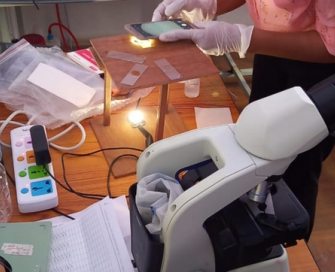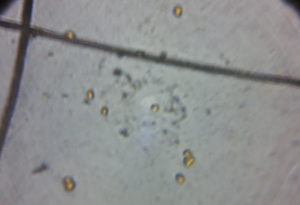
AI Assisted Microscopy
Using Smartphone Microscopes for Detection of Parasites.
Diarrheal diseases pose a significant threat to children under the age of five globally, with Nepal being no exception. This ailment contributes substantially to mortality and morbidity among children in Nepal, primarily due to the ingestion of contaminated food and water containing parasites such as giardia and cryptosporidium. Various detection methods, including fluorescence microscopy, ELISA tests, and PCR kits, are employed, with traditional brightfield microscopes being prevalent due to their accessibility. However, in resource-constrained regions like Nepal, these methods face challenges such as expensive equipment, the need for specialized expertise, and costly reagents. In response to these challenges, the Kathmandu Institute of Applied Sciences (KIAS) has developed a low-cost smartphone microscope priced at US$15, offering a promising solution for detecting diarrhea parasites in remote and underprivileged areas.
Problems:
1. High cost and expertise requirement of traditional microscopy setups hinder widespread deployment.
2. Scarcity of experts capable of analyzing samples and identifying parasites from images.
3. Lack of affordable options for parasite detection in remote healthcare and community settings.
4. Timely diagnosis and treatment of diarrheal diseases among vulnerable populations impeded due to these challenges.
Our Proposal:
1. Development of an AI-assisted parasite detection tool for smartphone microscopes.
2. Building a comprehensive database of annotated microscopic images containing giardia and cryptosporidium cysts.
3. Dataset collection across various sample types (water, vegetables, stools) to train and evaluate AI models.
4. Annotations by both experts and non-experts to assess performance under different availability scenarios.
5. Utilization of a web-based platform for collaborative data collection and annotation.
Project Status:
1. Multidisciplinary project involving AI researchers, microscopy experts, clinicians, and others.
2. Currently in the data collection phase with active participation from diverse stakeholders.
3. Clinical partners providing stool samples and facilitating access to datasets and images.
4. Development of a web-based platform for uploading and annotating microscopic images underway.
5. Commitment to overcoming challenges associated with parasite detection in resource-constrained settings.

PROJECT IN SUMMARY
Funded by:
Lacuna Fund and Wellcome Trust
Project Co-Leads:
Dr. Bishesh Khanal
Dr. Basant Giri (KIAS)
Project Team:
Udit Chandra Aryal, Safal Thapaliya, Prasuma
Rawal, members from KIAS
Clinical Partners:
Nyaya Health Nepal, Achham
Provincial Public Health Laboratory, Janakpur
Kathmandu Institute of Child Health,
Kathmandu
Damak Children’s Hospital, Jhapa
Paper publication details:
https://doi.org/10.1371/journal.pntd.0008560